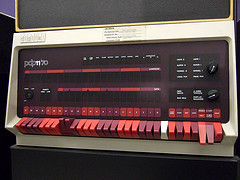Today I answered a survey question which reminded me that so many organisations still don’t “get” the Internet. Or is it only a reminder that I’m one of the digital elite?
In total, about how often do you access the internet across all locations at home, work, and elsewhere?
The most frequent option listed was “daily”.
Daily? I “access the Internet” many, many times a day. So often, in fact, that I think of the Internet as “always there”. Just like I think about electricity. Or running water. Or air. When I think about it at all, that is. These are all things I take for granted.
In total, about how often do you use electricity across all locations at home, work, and elsewhere?
Electricity is always there, keeping my home warm, my vegetables cool. Those wires bring me a constant supply of energy. And those other wires bring me a constant supply of information — and pipe information back to the world too.
That survey question is stuck in the past, where “the Internet” was a special place that you “logged on to”. That attitude is reflected in another survey question:
What do you mainly use the Internet for (choose one)?
Email
Software downloads
Travel information and bookings
Downloading videos
Weather
Web surfing & Experimenting
Adult entertaintment
Banking/Financial services
Business and business research
Blogging
Chat
Community forums and discussion groups
Dating
Health information
Instant messaging
Information search
News and reference
Self education (independent of schooling)
Shopping
Researching product information
Well, I don’t know. Try this question instead.
What do you mainly use electricity for (choose one)?
Lighting
Heating
Refrigeration
Cooking
Computing
Health Care
Entertainment
Communication
Security
Home maintenance
How on earth do you compare the relative importance of these things?
OK, perhaps I’m being harsh. It would seem that for most people the Internet is still a “special activity”, somehow different from the rest of their life.
That’s continually reflected in research from the Pew Internet and American Life Project. Just recently they pointed out that while 47% of American households have broadband, 15% still don’t have any Internet access or mobile phones at all. In Pew’s classification, I’m an omnivore, a group which represents the “top” 8% of Americans — and presumably about the same proportion of Australians.
Omnivores embrace all this connectivity, feeling confident in how they manage information and their many devices. This puts information technology at the centre of how they express themselves, do their jobs, and connect to their friends.
At the other end are those who are “off the network”:
Some 15% of Americans have neither a cell phone nor internet access. They tend to be in their mid-60s, nearly three-fifths are women, and they have low levels of income and education. Although a few have computers or digital cameras, these items seem to be about moving digital information within the household — for example, using the computer to display digital photos that they take or others physically bring into the house.
I don’t have ADSL2+ yet, nor a 24-inch monitor, so it’s easy to forget that I’m in the elite. It’s easy to forget that 70% of the people on Planet Earth have never made a telephone call, let alone sent an email or created Facebook pages.


 It’s 8am, a crisp winter morning. 11C outside. I drag a battered flannelette shirt over my t-shirt — a shirt that’s now 12 years old, I remember.
It’s 8am, a crisp winter morning. 11C outside. I drag a battered flannelette shirt over my t-shirt — a shirt that’s now 12 years old, I remember.


